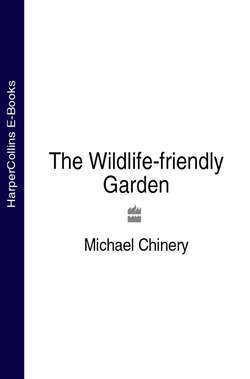Читать книгу The Wildlife-friendly Garden - Michael Chinery - Страница 8
Keep wildlife safe
ОглавлениеHousehold refuse Be sure to pick up any bottles and cans left in the garden after a party, or just a well-earned drink. Apart from the risk of causing injury to yourself or your family, these containers can become coffins for small animals.
Michael Chinery
The great green bush-cricket is a noisy inhabitant of the many undisturbed garden hedges and shrubberies that exist both on the European continent and in southern England.
Thousands of shrews and other small mammals die every year in carelessly abandoned bottles. Getting in to sample the dregs is easy, but climbing the smooth sides to get out again certainly is not. Drink cans are not quite so bad, but beetles and many other useful creatures regularly drown in them.
Michael Chinery
Let brambles scramble over your hedge. Insects will sip nectar from the flowers in summer and the birds, and you, will be able to enjoy the fruits later in the year.
Fruit bushes and netting If you need to put nets over your fruit bushes, do make sure that they are taut and well anchored so that birds and other animals cannot get tangled up in them.
Weedkillers and pesticides If you cannot survive without using weedkillers or other pesticides, be sure to follow the instructions carefully, and to dispose of any dregs where they cannot do any harm. It is very easy to kill vegetation and its associated animal life by careless application of pesticides, especially in windy conditions when sprays can drift far from their intended targets.
CONSERVATION TIP
Don’t use peat in your garden. Our peat bogs have shrunk alarmingly over the last 100 years or so because of the demand for peat, and their wildlife has dwindled accordingly. Plenty of alternatives to peat are on the market now, and for hanging baskets there is ‘Supermoss’ – a sphagnum substitute made from recycled cloth and paper pulp.
